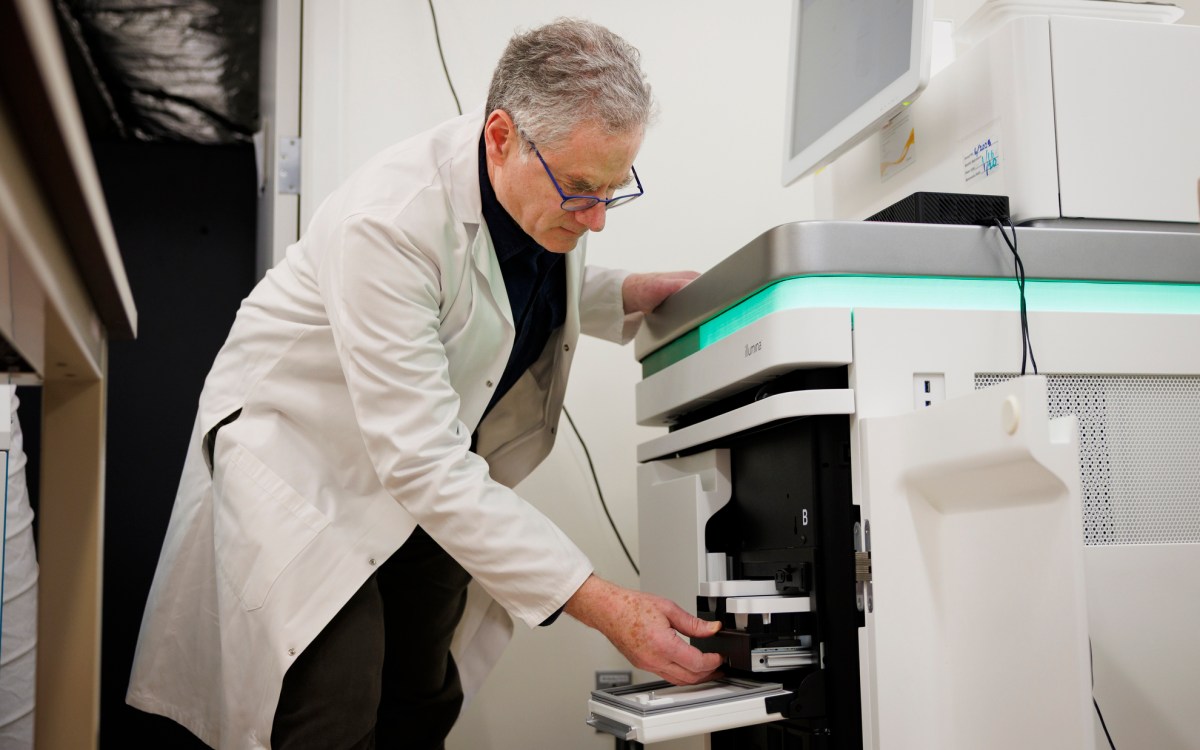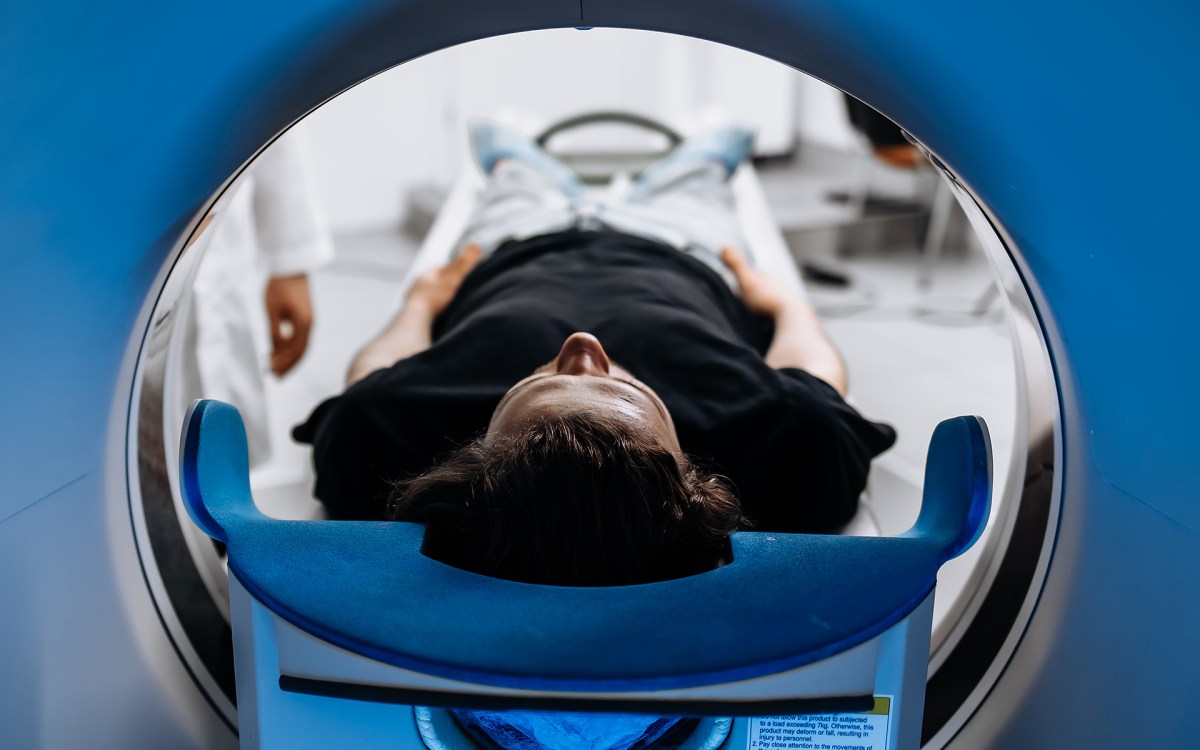Health
-

New AI tool predicts brain age, dementia risk, cancer survival
Unlike other AI models, BrainIAC needs limited data to ID key neurological health indicators

-

It’s time to get more comfortable with talking about dying
Palliative care physicians offer advice for end-of-life conversations between patients, loved ones
-

Turns out inherited eye diseases aren’t a sure thing
Study finds only fraction of those with mutated gene develop malady — a finding that could lead to better treatments (and could apply to other such illnesses)
-

How smoking divides America
Mapping the midlife effects of a lethal habit
-

Americans living longer after cancer diagnosis
Oncologist explains why rising survival rates only tell part of the story
-

Parental firearm injury linked to surge in children’s psychiatric diagnoses
Trauma/post-traumatic stress disorder accounts for most of the increase, according to study

-
Harvard researchers take aim at asthma
Asthma is one of the most common chronic conditions in America, afflicting about 15 million people and causing 5,000 deaths annually, according to the National Institutes of Health. Asthma rates…
-
Heart attack patients may benefit from drinking tea
A study published in the May 7, 2002, issue of Circulation: Journal of the American Heart Association found that tea consumption is associated with an increased rate of survival following…
-
Peripheral ‘Swatch’ watches are powerful force in modulating body’s circadian rhythms
Clinicians have known for years that organs function at different rates — the heart beats, kidneys transport ions and electrolytes, the liver metabolizes lipids, sugars, and amino acids differently over…
-
Increased intake of dairy products may help reduce risk of insulin resistance
Milk intake has decreased significantly over the past three decades while the prevalence of obesity and type 2 diabetes has increased. The authors of a Harvard research study note that…
-
Changes in brain shown with learning
Harvard Medical School researchers Vadim Bolshakov, Evgeny Tsvetkov, and Bill Carlezon, based at McLean Hospital, reported with colleagues in the April 11, 2002 issue of the journal Neuron that they…
-
New tool speeds study of mammalian protein function
A new technology developed by Harvard Medical School researchers in the laboratory of Yang Shi, associate professor of pathology, extends the range of possibilities of selective interference of gene expression…
-
Meditation dramatically changes body temperatures
Harvard researcher Herbert Benson, who has been studying a meditation technique known as “g Tum-mo” for 20 years, says that “Buddhists feel the reality we live in is not the…
-
Death protein may cause neural tube defects in babies of diabetic mothers
A research report provides a possible explanation for a class of birth defects that appears to be on the rise. A protein normally involved in programmed cell death may, as…
-
Imagination important for children’s cognitive development
Paul Harris, a professor at Harvard’s Graduate School of Education, says there are two very different ways to define imagination. “You can either see it as disappearing or waning during…
-
Alien abduction claims examined
Richard McNally, a Harvard professor of psychology, and his colleagues recruited six women and four men who claimed they had been spirited away by extraterrestrials, some of them more than once.
-
Researchers eye earliest triggers of age-related macular degeneration
Age-related macular degeneration is the leading cause of blindness for Americans over 60 years of age. It affects more than 14 million people. But how it attacks the macula, the…
-
Hormone leptin tied to fat breakdown in muscle
Research has shown that leptin is an important hormone with a hand in many metabolic processes. It undoubtedly has widespread effects that may influence diabetes as well as obesity. Recent…
-
Study links Western dietary pattern with greater risk for type 2 diabetes in men
About 16 million Americans have type 2 diabetes, which can cause blindness, kidney failure, and heart disease. Now researchers from the Harvard School of Public Health have linked a diet…
-
FDA approves Gleevec as oral treatment for gastrointestinal stromal cancer
George Demetri, medical director of the Sarcoma Center at Dana-Farber Cancer Institute and associate professor of medicine at Harvard Medical School, was the lead investigator of a clinical study that…
-
Mouse model devised that develops asthma
A Harvard research team led by Laurie Glimcher, Irene Heinz Given professor of immunology at the Harvard School of Public Health and a Harvard Medical School professor of medicine, two…
-
Mutation reported with AIDS vaccine
Researchers are working feverishly to develop an effective vaccine against the AIDS virus. Various vaccines have been tested. One of the more promising vaccine trials involved eight monkeys. When one…
-
Cell surface proteins can have pro- and anti-angiogenic face
Angiogenesis is the process by which cancer tumors develop a network of blood vessels to feed them, so that they may continue their growth. The strategy that cancer cells use…
-
Pigment plays role in Xenopus development
Harvard Medical School researchers have discovered that a pigment contained in the egg of the South African claw-toed frog is indispensable for development. Witout the pigment, called biliverdin, which is…
-
Researchers find better way to predict childhood brain tumor outcomes
About 2,000 children a year are diagnosed with medulloblastoma, or brain tumor. In a study, researchers examined gene expression patterns from 99 patient tumor samples of three different types of…
-
Can weight loss decrease heart disease in type 2 diabetes?
Can weight loss decrease heart disease in type 2 diabetes? That’s the question being asked by Harvard researchers and others based at three Boston medical centers. In a nationwide study…
-
Minimally invasive surgical procedure offers limited benefits for colon cancer patients
A national clinical trial compared the effects of standard colon cancer surgery with a newer, minimally invasive procedure for removing tumors called laparoscopic surgery. Researchers from Dana-Farber Cancer Institute and…
-
Link found between body rhythms and circadian clock, light
The brain’s circadian clock is a tiny cluster of neurons behind the eyes. This cluster of cells sends out signals that control the body’s daily rhythms. New research from Harvard…
-
Discovery could aid in therapeutic cloning, clamping down on cancer
“Our focus is to understand the very first few steps that drive a cell to become an intestinal cell instead of a muscle cell,” says Yang Shi, Harvard Medical School…
-
Biostatisticians crunch data vital to AIDS research, genetics
Broadly defined, statistical genetics is the development of methods to analyze DNA. In recent years, the term has been more specifically applied to gene mapping, or the search for locations…
-
Lack of protein ApoE in brain may raise Alzheimer’s risk
Brain cells are protected from possible contamination by substances in circulating blood by what is known as “the blood-brain barrier.” Researchers have many questions about precisely how this protective mechanism…
-
Study adds to the understanding of musical pitch perception
There are differences in the sounds of two voices or two musical instruments even if they hit the same note, and somehow the brain knows that. A new study shows…
-
Study upends earlier thinking about immune cell’s readiness against disease
A type of disease-fighting cells in the body — T cells — have a reputation for being ever-ready to fight invading infections. But that’s not the way they really work,…
-
Researchers explain how protein inhibits growth of blood vessels
Thirty years ago, Judah Folkman, of Children’s Hospital Boston and Harvard Medical School, first developed the idea that cancerous tumors are dependent on the growth of small blood vessels. Since…
-
Study reveals how child abuse can lead to substance abuse
It’s a common-sense notion that those who have been abused as children may became drug abusers later in life. But why is this so? Carl Anderson, a Harvard instructor in…
-
Study finds embryonic stem cells can repair heart muscle
Heart failure develops when the heart stops pumping effectively due to the destruction of muscle cells, known as cardiomyocytes. Damage inflicted during a heart attack causes massive loss of cardiomyocytes,…


